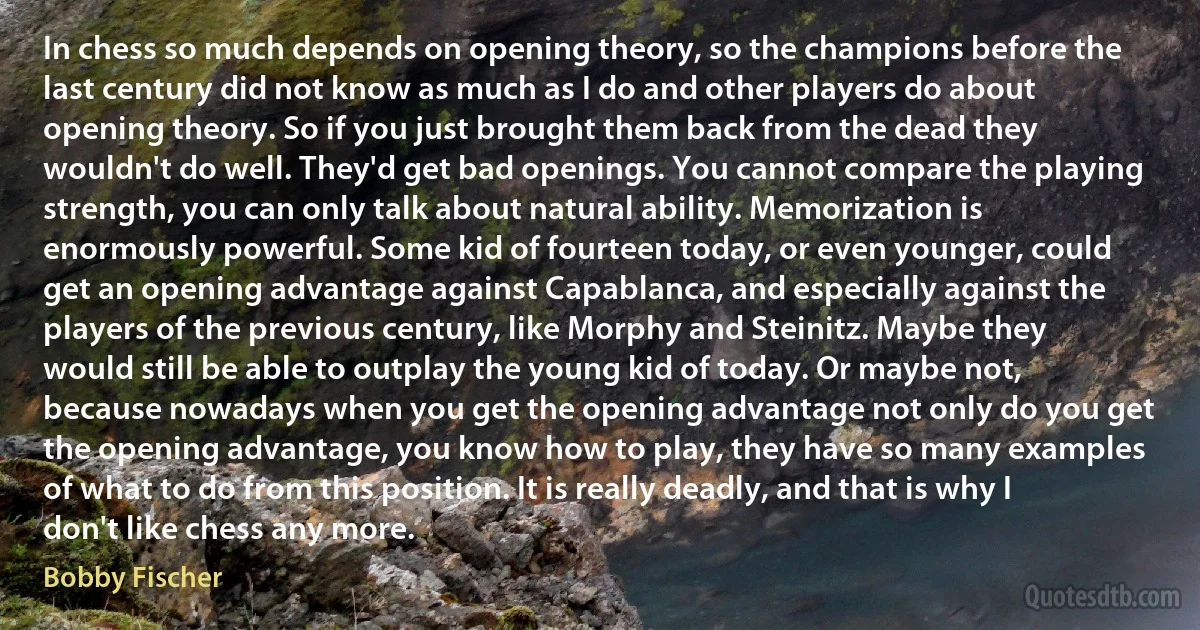
In chess so much depends on opening theory, so the champions before the last century did not know as much as I do and other players do about opening theory. So if you just brought them back from the dead they wouldn't do well. They'd get bad openings. You cannot compare the playing strength, you can only talk about natural ability. Memorization is enormously powerful. Some kid of fourteen today, or even younger, could get an opening advantage against Capablanca, and especially against the players of the previous century, like Morphy and Steinitz. Maybe they would still be able to outplay the young kid of today. Or maybe not, because nowadays when you get the opening advantage not only do you get the opening advantage, you know how to play, they have so many examples of what to do from this position. It is really deadly, and that is why I don't like chess any more.
Bobby FischerRelated topics
ability able advantage bad century compare dead kid last natural playing play position strength talk well young today memorization youngerRelated quotes
The powers, and faculties, and principles that are necessary fully to comprehend all that we see and all that surrounds us, exist and have been bestowed on man by his beneficent Creator. Still, it is only by slow degrees that he is to become their master, acquiring knowledge, step by step, as he has need of its services, and learns how to use it. Such seems to be the design of Providence, which is gradually opening to our inquiries the arcana of nature, in order that we may convert their possession into such uses as will advance its own wise intentions. Happy are they who feel this truth in their character of individuals! Thrice happy the nations which can be made to understand, that the surest progress is that which is made on the clearest principles, and with the greatest caution! The notion of setting up anything new in morals, is as fallacious in theory as it will be found to be dangerous in practice.

James Fenimore Cooper
For The United States, the leading space faring nation for nearly half a century, to be without carriage to low Earth orbit and with no human exploration capability to go beyond Earth orbit for an indeterminate time into the future, destines our nation to become one of second or even third rate stature. While the President's plan envisages humans traveling away from Earth and perhaps toward Mars at some time in the future, the lack of developed rockets and spacecraft will assure that ability will not be available for many years.
Without the skill and experience that actual spacecraft operation provides, the USA is far too likely to be on a long downhill slide to mediocrity. America must decide if it wishes to remain a leader in space. If it does, we should institute a program which will give us the very best chance of achieving that goal.

Neil Armstrong
The evils of a military system, which, after all, every day must attenuate, are light compared with the evils of an anarchic conservatism reinstated in central Europe. Divided Germany means preponderating Russia. What can be more desirable in the interests of the highest civilisation than the interposition in the heart of the European state-system, of a powerful, industrious, intelligent, and progressive people, between the western nations and the half-barbarous Russian swarms? To the careful observer of the history of modern Europe it is plain that increasing vigour and self-conscious strength in Germany are other words for the spread eastwards of the best of those ideas, the most durable of those civilising elements, in which the difference of historic development has enabled England and France to anticipate her.

John Morley, 1st Viscount Morley of Blackburn
I see those pretended politicians who place all their subtlety, and who think they serve their country best, in circumventing those with whom they treat, interpreting the conditions of a treaty in such a manner, that all the advantage results to their own country. Far from blushing at conduct so contrary to equity, to right, and to national honesty, they boast of their dexterity, and pretend that they deserve the name of great negociators. How long shall public men boast of conduct which would disgrace a private individual? ...Shall powerful states abandon openly that which is honest, for that which may appear useful? It often happens for the happiness of the human race, that this pretended utility is fatal to the powers who follow it, and that, even among sovereigns, candour and right are found to be the safest policy.

Henry Temple, 3rd Viscount Palmerston
A final aspect of all open access orders is Schumpeter's notion of creative destruction, one of the most powerful descriptions of a competitive, open access economy. When Schumpeter wrote Capitalism, Socialism, and Democracy in the early 1940s, the economic theory of perfect competition among atomistic firms (i. e., firms too small to have market power) had come under sustained attack as unrealistic. Large and powerful economic organizations dominated the new economy, and their behavior did not match the textbooks. Despite this dominance, the economy produced historically unprecedented, sustained economic development. Schumpeter asked, How could large businesses that were supposed to choke off competition and growth nonetheless generate such spectacular productivity increases in a world that seemed ever more competitive?

Douglass North
